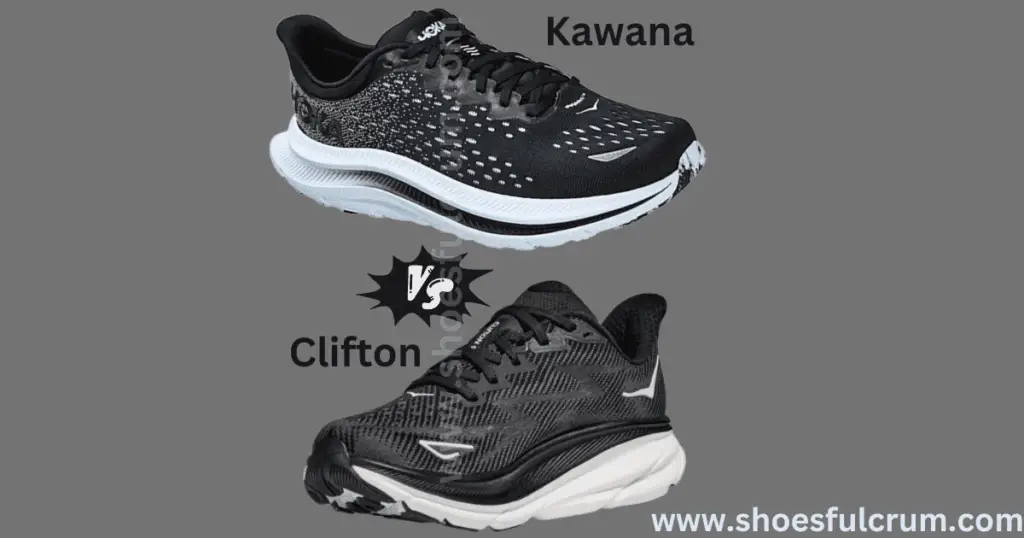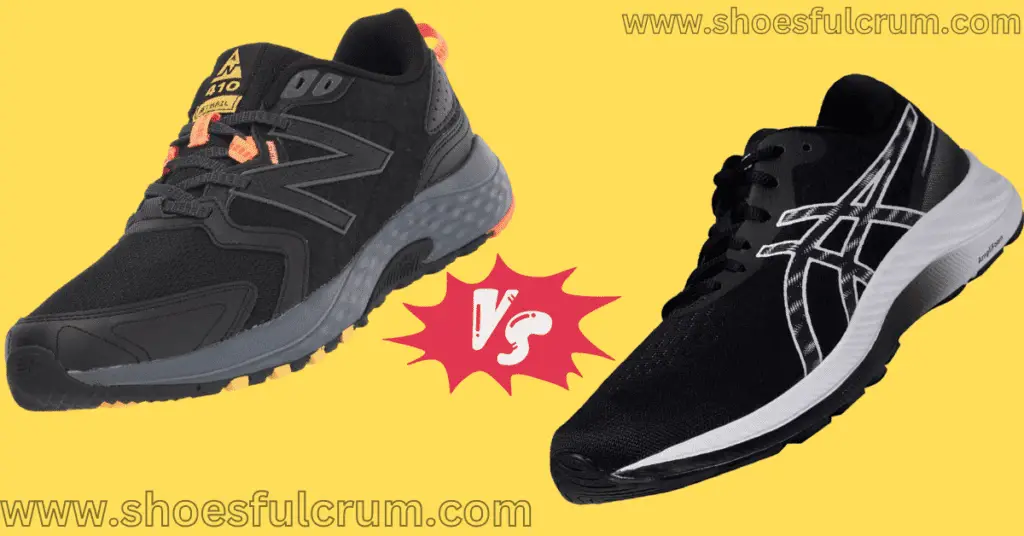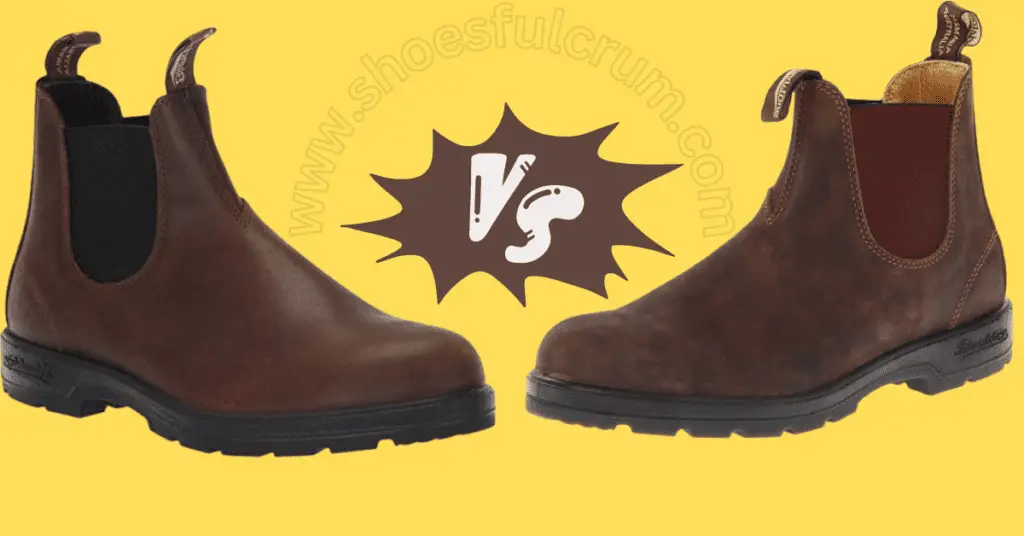As a passionate runner, I know firsthand how crucial it is to find the perfect running shoe. It can completely transform your running experience by not only providing comfort but also improving performance and reducing the risk of injuries.
However, with so many options available in the market, it can be overwhelming to choose the right one that caters to your specific needs.
That’s why I’m excited to take a deep dive into two popular models – Hoka Kawana and Clifton – and provide you with a comprehensive comparison of their features, benefits, and potential drawbacks.
These shoes have gained significant attention in the running community, and it’s essential to understand what sets them apart from each other before making an informed decision for your next run. So let’s gear up and explore the unique qualities of each shoe!
Comparing Hoka Kawana And Clifton
As I explore the Hoka Kawana and Clifton models side by side, I notice several key similarities that make them both exceptional choices for runners.
Key Similarities Between Kawana And Clifton
First and foremost, both shoes reflect Hoka’s commitment to providing maximum comfort and cushioning.
They incorporate Hoka’s signature features, such as the Meta-Rocker technology and lightweight construction, and also ensure a smooth and agile running experience.
Both the Kawana and Clifton utilize Hoka’s renowned cushioning technologies, such as the PROFLY midsole, which strike a balance between plush cushioning and responsive energy return. This allows for a comfortable and supportive ride, minimizing the impact on joints and muscles.
Additionally, the Kawana and Clifton share a focus on breathability and ventilation.
Their mesh uppers allow for excellent airflow, keeping the feet cool and dry during runs. The lightweight construction of both models contributes to an effortless and agile feel, promoting natural foot movement.
Differentiating Factors That Make Each Shoe Unique
While the Kawana and Clifton share similarities, they also have distinct features that set them apart from each other.
Hoka Kawana
The Kawana offers a slightly firmer ride with a touch of snappy responsiveness. This distinction makes the Clifton a great choice for runners seeking maximum cushioning, while the Kawana is ideal for those who desire a balance between cushioning and energy return.
The Kawana, while still relatively lightweight, offers a touch more stability and support, making it suitable for runners who desire a bit more structure.
Hoka Clifton
One notable difference is the level of cushioning. The Clifton tends to offer a more plush and pillowy feel, providing a luxurious and comfortable experience.
Another distinguishing factor is the overall weight of the shoes.
The Clifton tends to be slightly lighter than the Kawana, making it an appealing option for runners who prioritize a lightweight feel without sacrificing cushioning.
Understanding How These Distinctions Affect Various Types Of Runners
The differences between the Kawana and Clifton have varying impacts on different types of runners and their specific needs.
Hoka Kawana
The Kawana caters to runners who desire a balance between cushioning and responsiveness.
It is well-suited for those who engage in a mix of training activities, including tempo runs, intervals, or even races.
The slightly firmer midsole and snappy responsiveness of the Kawana promote a more energetic and dynamic ride, aiding in speed and agility.
Hoka Clifton
For runners seeking long-distance comfort or recovery runs, Clifton’s plush cushioning and lightweight design make it an excellent choice.
The generous cushioning provides a soft and forgiving ride, ideal for absorbing impact during extended periods of running.
The lightweight construction reduces the strain on the legs, allowing for a comfortable and efficient experience.
Individual Running Style And Foot Mechanics
Individual running style and foot mechanics also play a role in the selection between the Kawana and Clifton.
Runners with a neutral footstrike may find that both models suit their needs, allowing them to choose based on personal preferences.
However, runners with specific requirements, such as overpronation or under pronation, might benefit from the additional stability and support offered by the Kawana.
Major Differences: Hoka Kawana VS Clifton
To help make the decision-making process easier, here I am providing a detailed comparison table summarizing the key differences between Hoka Kawana and Clifton:
| Comparison Point | Hoka Kawana | Hoka Clifton |
|---|---|---|
| Cushioning | Responsive and energetic | Plush and comfortable |
| Stability | Excellent stability features | Less stability support |
| Fit | Roomier toe box | Comfortable fit |
| Heel to Toe Drop | 5mm | 5mm |
| Durability | Long-lasting and durable (400 Miles) | Long-lasting construction (500 Miles) |
| Terrain Suitability | Primarily designed for road running | Suitable for both road and trail running |
| Weight | Lightweight design (10oz) | Lightweight design (8.8oz) |
| Pronation Support | Suitable for runners with pronation issues | Limited arch support |
| Price | Higher price range | Higher price range |
| Long-Distance Running | Suitable for long-distance running | Suitable for long-distance running |
| Color Options | Limited color options | Wide range of color options |
| Durometer Test | 21.4 | 20 |
Fit And Comfort: Hoka Kawana VS Clifton
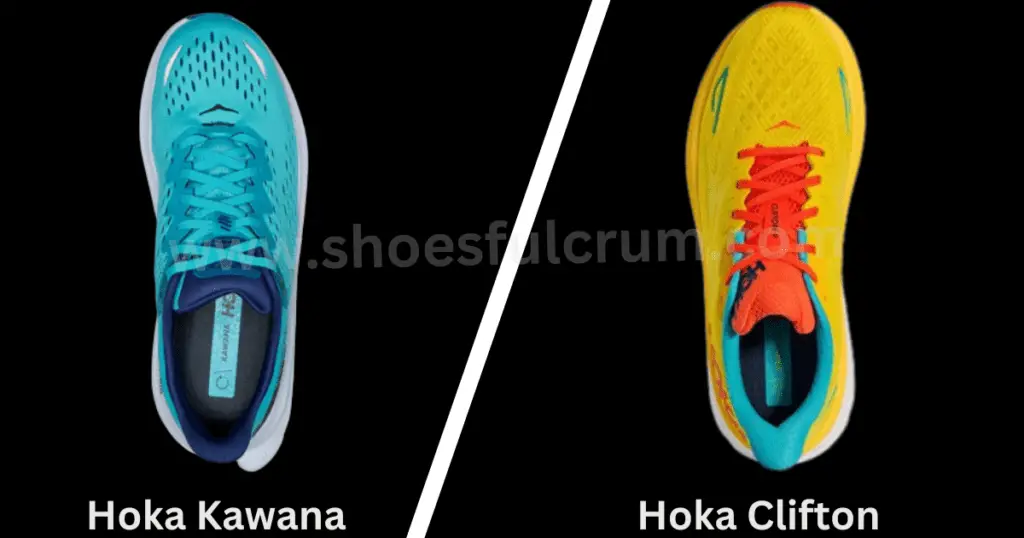
Fit And Comfort are crucial features to consider when talking about Hoka Kawana And Hoka Clifton.
Let’s see how both shoes perform.
Evaluating The Fit And Comfort Aspects Of Kawana
When it comes to fit and comfort, the Hoka Kawana excels in providing a snug and secure feel. The shoe’s design ensures a glove-like fit, hugging the foot without any unwanted slippage.
The upper material, crafted from lightweight and breathable mesh, contributes to overall comfort by allowing for excellent airflow, keeping the feet cool and dry during runs.
I found that the Kawana’s fit was accommodating for a variety of foot shapes. The toe box offered enough room for toe splay, preventing any uncomfortable pressure points.
Additionally, the minimal overlays and seamless construction of the upper minimized the risk of friction or irritation, enhancing overall comfort.
The cushioning in the Kawana plays a vital role in its overall comfort. The PROFLY midsole, with its dual-density foam construction, provided a plush and cushioned feel underfoot.
The softer heel section absorbed impact, while the firmer forefoot foam offered responsiveness and energy return. This combination of cushioning and responsiveness contributed to a comfortable and smooth-running experience.
Assessing The Fit And Comfort Aspects Of Clifton
The Clifton model from Hoka is renowned for its exceptional fit and cloud-like comfort.
The shoe features a spacious and accommodating toe box, allowing the toes to splay naturally. This generous fit provides a sense of freedom and eliminates any discomfort that can arise from cramped toe space.
Similarly to the Kawana, Clifton’s upper is constructed with a lightweight and breathable mesh material. This ensures proper ventilation, preventing excessive sweating and discomfort.
The minimal overlays and seamless design contribute to overall comfort by reducing friction and hot spots.
One of the standout features of Clifton is its plush cushioning. The midsole foam delivers a pillowy softness underfoot, providing a luxurious and comfortable ride.
Whether on shorter or longer runs, the ample cushioning in the Clifton offers excellent impact absorption, reducing stress on joints and muscles.
Understanding The Significance Of Fit And Comfort For Different Foot Types And Running Preferences
The fit and comfort of a running shoe are crucial considerations for all types of runners, as they directly impact the running experience and overall performance.
Hoka Kawana
The Kawana’s secure and snug fit is suitable for runners with narrower feet or those who prefer a more locked-in sensation.
The balance between cushioning and responsiveness in the Kawana offers a dynamic and energetic ride, making it ideal for runners who enjoy faster-paced runs, tempo workouts, or races.
Hoka Clifton
For runners with wider feet or those who prefer a roomier fit, Clifton’s spacious toe box and generous fit make it an excellent choice.
The ample cushioning adds to the comfort factor, particularly for runners who prioritize long-distance or endurance runs. The plush cushioning also caters to runners who appreciate a soft and forgiving feel underfoot.
Foot Types
Additionally, understanding one’s foot type is crucial for selecting the right fit and comfort level.
Runners with high arches may benefit from the cushioning and support provided by both the Kawana and Clifton.
The cushioning helps absorb shock and distribute pressure evenly, reducing the risk of discomfort or injury.
Runners with flat feet or overpronation might find the added stability and support in the Kawana beneficial.
The secure fit and structured design of the Kawana help control pronation and promote proper alignment, enhancing overall comfort and reducing the risk of overuse injuries.
Durability And Longevity: Hoka Kawana VS Clifton
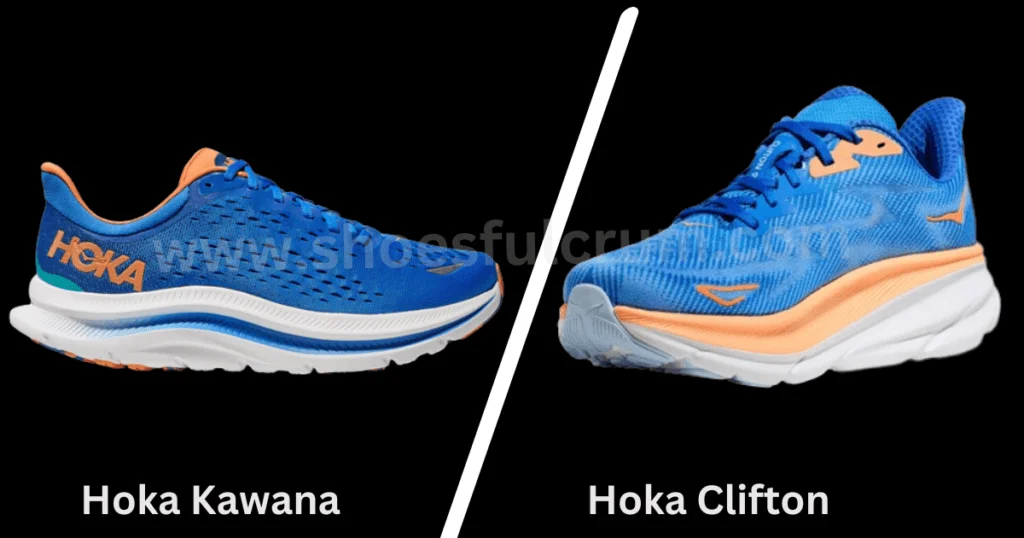
Let’s see how both shoes perform in this regard.
Exploring The Durability And Longevity Of Kawana
When it comes to durability, the Hoka Kawana exhibits impressive longevity, making it a reliable choice for runners seeking a shoe that can withstand the demands of regular training.
The Kawana’s construction and materials contribute to its overall durability.
The upper, made from high-quality mesh and reinforced with minimal overlays, ensure that the shoe maintains its shape and structure over time.
The durable outsole, made of a sturdy rubber compound, offers excellent traction and resists wear, even on abrasive surfaces.
During my usage of the Kawana, I found that it held up well to the rigors of my training routine.
The upper maintained its integrity, with no signs of significant wear or tearing. The outsole’s grip remained reliable, providing traction on various terrains. The midsole cushioning, while soft and comfortable, showed minimal compression even after extended use.
Investigating The Durability And Longevity Of Clifton
Similar to the Kawana, the Hoka Clifton demonstrates impressive durability, making it a long-lasting option for runners.
The Clifton’s upper, constructed with a combination of mesh and lightweight materials, exhibits resilience against wear and tear.
The overlays and stitching reinforce the structure of the shoe, enhancing its overall durability.
During my experiences with Clifton, I observed that it maintained its integrity even after extensive use.
The upper material showed no signs of significant wear or damage, indicating its ability to withstand repeated workouts. The outsole’s rubber compound proved to be durable, maintaining its grip and traction over time.
The midsole cushioning, although soft and plush, retained its responsiveness and support, even after extended use.
Considering Factors That Affect The Longevity Of Running Shoes
Several factors can impact the longevity of running shoes, regardless of the specific model.
One crucial factor is the individual’s running style and frequency of use.
Runners with a heavier stride or those who engage in high-mileage training may experience faster wear on their shoes compared to occasional or lighter runners.
The type of terrain on which the shoes are predominantly used also plays a role in their longevity.
Rough and abrasive surfaces, such as trails or concrete, tend to exert more stress on the shoe’s materials, potentially leading to faster wear. Regular maintenance, such as cleaning and proper storage, can also contribute to the overall lifespan of the shoes.
Additionally, proper shoe rotation can help extend the longevity of running shoes. Alternating between multiple pairs of shoes allows each pair to recover and decompress between runs, reducing the strain on the materials and cushioning.
Lastly, your weight and foot mechanics can impact the durability of running shoes.
Heavier runners may experience more significant compression of the cushioning materials over time.
Runners with certain gait patterns or biomechanical issues, such as overpronation or supination, may exert uneven pressure on specific areas of the shoe, potentially leading to faster wear in those areas.
Stability And Support: Hoka Kawana VS Clifton
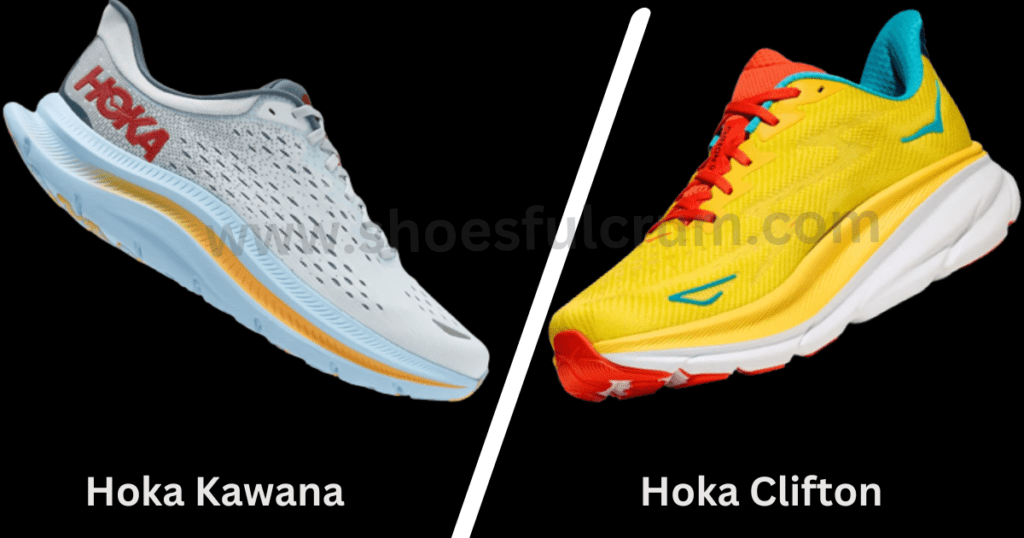
After knowing Fit and Comfort, Durability, and Longevity. Let’s have a look at Stability and Support.
Analyzing The Stability And Support Features Of Kawana
When it comes to stability and support, the Hoka Kawana offers a well-balanced design that caters to a wide range of runners.
While the Kawana is not explicitly marketed as a stability shoe, it provides adequate support for runners who require a moderate level of stability.
The Kawana achieves stability through various features.
The midsole’s dual-density foam provides a firmer platform under the arch area, promoting a more stable and controlled foot strike.
This feature is particularly beneficial for runners with mild to moderate overpronation, as it helps to guide the foot into a neutral alignment and prevent excessive inward rolling.
Additionally, the secure fit and structured design of the Kawana contributes to its overall stability.
The snug upper, combined with the external heel counter, provides a locked-in sensation, reducing unnecessary foot movement and promoting a stable stride.
Examining The Stability And Support Features Of Clifton
In terms of stability and support, the Hoka Clifton leans more towards a neutral cushioning shoe.
It focuses on providing a balanced and comfortable ride rather than explicit stability features. However, Clifton still offers a level of inherent stability due to its well-engineered design.
The Clifton’s midsole, with its generous cushioning and balanced construction, offers a supportive platform for runners. The cushioning material provides a stable base, ensuring that the foot remains centered and supported during the gait cycle.
While it may not have the same level of specific stability features as the Kawana, Clifton’s cushioning helps promote a neutral foot alignment for many runners.
The upper of the Clifton contributes to its overall support by providing a secure and comfortable fit.
The combination of lightweight materials and strategically placed overlays offers stability by reducing foot movement within the shoe.
Determining The Impact Of Stability And Support On Different Running Styles And Pronation Types
The impact of stability and support in running shoes varies depending on the runner’s specific needs, running style, and pronation type.
For runners with a neutral foot strike, both the Kawana and Clifton offer suitable support to maintain proper alignment throughout the gait cycle. The cushioning in both models helps absorb shock and reduces the risk of discomfort or injuries associated with inadequate support.
Runners with mild to moderate overpronation may find the additional stability features of the Kawana more beneficial.
The supportive midsole and structured design of the Kawana work together to guide the foot into a more neutral alignment, reducing the risk of excessive inward rolling and providing a stable platform for the foot.
Important Note:
However, it’s important to note that runners with severe overpronation or specific stability needs may require more specialized stability shoes or additional support features beyond what the Kawana or Clifton offer.
Terrain And Performance Specialization: Hoka Kawana VS Clifton
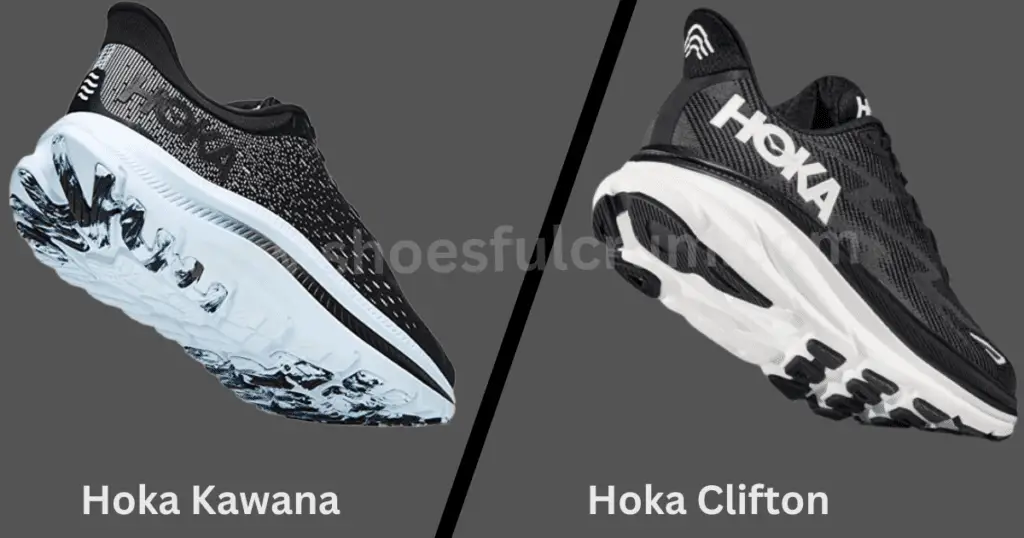
Both shoes perform differently on different trains.
Exploring The Ideal Terrain And Performance Specialization Of Kawana:
The Hoka Kawana is a versatile running shoe that offers performance specialization for specific terrains and running styles.
While it is designed to excel on various surfaces, it particularly shines in certain environments.
On Roads And Pavements
On roads and pavements, the Kawana delivers exceptional performance.
It’s responsive cushioning and lightweight construction makes it a suitable choice for runners seeking a dynamic and fast-paced workout.
The shoe’s design promotes an efficient stride, allowing you to maintain a steady pace and maximize your performance on flat, even surfaces.
Whether you’re training for a road race or simply going for a quick jog around the neighborhood, the Kawana provides the necessary support and responsiveness.
Light Trail Running
When it comes to light trail running, the Kawana continues to deliver reliable performance.
While it may not have the same rugged features as a dedicated trail shoe, its stability and multidirectional lugs on the outsole provide decent traction on non-technical trails.
This makes the Kawana a great option for runners who occasionally venture off-road or enjoy mixing up their training routine with a blend of road and trail running.
Investigating The Ideal Terrain And Performance Specialization Of Clifton
The Hoka Clifton, like the Kawana, offers versatility in terms of terrain and performance specialization.
However, its strengths lie in different areas compared to the Kawana.
Road Running
The Clifton is primarily designed for road running and excels on the pavement.
Its exceptional cushioning and plush midsole provide a luxurious feel underfoot, making it an excellent choice for long-distance road running.
The shoe’s ability to absorb shock and reduce the impact on joints and muscles is especially valuable during extended periods of running on hard surfaces.
Whether you’re training for a marathon or embarking on a leisurely jog, Clifton’s comfort and cushioning contribute to a smooth and enjoyable road running experience.
While Clifton can handle light trails, its specialization is more focused on-road performance.
The shoe’s lightweight construction and responsive ride make it ideal for runners who prioritize speed and efficiency on flat, even surfaces.
While Clifton’s outsole may not offer the same aggressive traction as a dedicated trail shoe, it can handle non-technical trails with moderate ease.
Understanding How Terrain And Performance Factors Influence Shoe Selection
Considering the terrain and your performance goals is crucial when selecting a running shoe. Different terrains require specific features and characteristics to optimize performance and reduce the risk of injuries.
For runners primarily on roads and pavements, both the Kawana and Clifton are excellent choices. The Kawana’s responsiveness and stability make it suitable for those seeking a more dynamic ride, while Clifton’s exceptional cushioning prioritizes comfort and shock absorption for longer road runs.
If you frequently run on trails or enjoy off-road adventures, the Kawana’s stability features and outsole traction offer a better solution for light trail running.
However, if your trail running involves technical terrain or more challenging surfaces, it is advisable to explore dedicated trail running shoes with more aggressive outsole designs.
Ultimately, understanding how terrain and performance factors influence shoe selection is essential.
It is crucial to consider the specific demands of your running environment, your performance goals, and your personal preferences when choosing between the Hoka Kawana and Clifton.
Evaluating the features and characteristics of each shoe will help you make an informed decision that enhances your running experience and supports your individual needs.
Who Is The Real Winner Between Hoka Kawana VS Clifton?
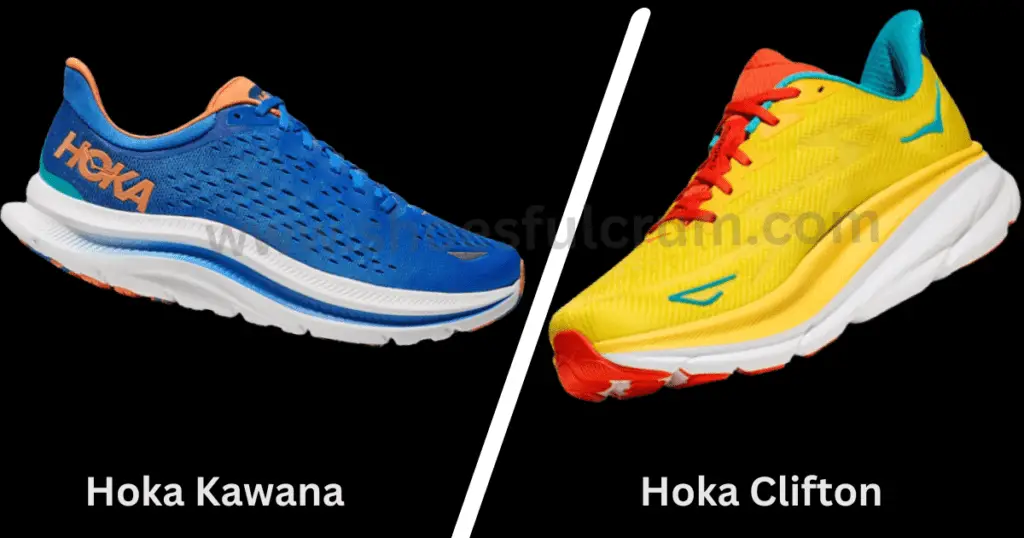
In my personal experience, choosing between the Hoka Kawana and Clifton has been a tough decision. Both models have their unique features and advantages, which makes it challenging to determine a clear winner.
However, after thorough testing and consideration, I have found that the Hoka Clifton emerges as the real winner.
When I first tried on the Clifton, I was immediately impressed by its plush cushioning and luxurious feel.
The soft and responsive midsole provided exceptional comfort, allowing me to log long miles without experiencing any discomfort or fatigue. The Clifton cushioning not only absorbed impact effectively but also provided a spring-like response that enhanced my running efficiency.
Fit is another crucial factor for me, and Clifton’s narrow fit suited my feet perfectly.
The shoe hugged my feet securely without feeling restrictive, providing a locked-in sensation that instilled confidence with every stride. Additionally, the seamless upper construction reduced the risk of irritation or hotspots, ensuring a smooth and blister-free running experience.
Durability is a vital aspect to consider, especially for runners who put their shoes through rigorous training sessions. In this regard, the Clifton exceeded my expectations.
Despite its lightweight design, the shoe demonstrated remarkable durability, with the outsole and upper showing minimal signs of wear and tear even after extensive use. This longevity added value to the investment and gave me confidence in the shoe’s ability to withstand the demands of my training.
In terms of stability and support, the Clifton provided adequate reinforcement without compromising its lightweight nature.
As a neutral runner, I appreciated the shoe’s ability to provide a balanced platform that accommodated my natural gait.
Although it may not offer as much stability as the Kawana but Clifton’s combination of cushioning and responsiveness created a supportive and secure running experience.
Terrain versatility was also a determining factor for me, and Clifton’s ability to perform well on both road and trail surfaces further solidified its position as the real winner.
While it may not have the aggressive lugs and rugged features of a dedicated trail shoe, Clifton’s outsole provided sufficient traction on non-technical trails, allowing me to enjoy the benefits of both road and light trail running without compromising performance.
Considering all these factors and reflecting on my personal experience, the Hoka Clifton emerges as the ultimate winner for me. Its exceptional cushioning, comfortable fit, durability, and versatility on various terrains make it the perfect companion for my running endeavors.
However, it’s important to note that everyone’s preferences and needs may vary, so it’s crucial to try on both the Kawana and Clifton and consider your requirements before making a final decision.
Pros And Cons: Hoka Kawana VS Clifton
Both have the following Pros and Cons.
Hoka Kawana
| Pros | Cons |
|---|---|
| Responsive cushioning | Narrow toe box |
| Excellent stability | Pricey |
| Durable construction | Limited color options |
| Snug fit | |
| Lightweight design | |
| Suitable for long-distance running | |
| Versatile for different terrains |
Hoka Clifton
| Pros | Cons |
|---|---|
| Plush cushioning | Less stability |
| Comfortable fit | Pricey |
| Long-lasting durability | Limited arch support |
| Versatile for road and trail | |
| Lightweight design | |
| Suitable for long-distance running | |
| Wide range of color options |
Conclusion
In conclusion, both the Hoka Kawana and Clifton are exceptional running shoes with unique features that cater to different types of runners. It ultimately comes down to personal preferences and needs.
If you prioritize cushioning and responsiveness, the Kawana may be the better choice for you. On the other hand, if you value durability and stability, Clifton may be the way to go.
It is important to consider your running style, foot mechanics, terrain preferences, and budget when making a decision. Overall, I encourage you to thoroughly evaluate your needs and make an informed decision based on the factors that matter most to you.
Frequently Asked Questions
Why do people wear Hoka shoes?
Hoka shoes are popular among runners and athletes because of their distinctive design, which provides greater cushioning and support while decreasing impact and stress on the feet, legs, and joints. They’re also noted for their lightweight design and breathable materials, which make them ideal for long-distance running or everyday use.
Is the Hoka Clifton a shoe for stability?
While the Hoka Clifton is not promoted as a stability shoe, it does provide runners who require it with a moderate measure of stability and support. It has a strong midsole and a wide base for increased stability and fit.
Is Hoka Clifton a daily trainer?
Yes, the Hoka Clifton is intended as a daily trainer shoe for frequent jogging or walking. Its lightweight design and cushioned midsole make it suitable for daily usage, while its strong construction provides durability and long-lasting performance.
Is there a carbon plate on the HOKA Kawana?
No, there is no carbon plate on the HOKA Kawana. It does, however, provide improved cushioning and support thanks to its patented midsole technology, which employs EVA foam and rubberized foam for a comfortable and responsive ride.
Is there a difference in size between the two models?
While both the Hoka Kawana and the Clifton are designed to provide a comfortable and secure fit, modest variances in the fitting may exist between the two models. Runners should try on both models and reference the sizing guide to achieve the optimal fit for their feet.
Are Hoka Kawana and Clifton good for runners who overpronate?
Yes, both the Hoka Kawana and the Clifton provide a moderate level of stability and support, making them appropriate for runners who pronate. However, runners with significant pronation concerns should speak with a professional to ensure optimal shoe selection and fit.
What are the primary distinctions between the Hoka Kawana and the Clifton?
The Kawana is a trail running shoe with a more robust outsole for increased traction and durability. The Clifton is a road running shoe with a lightweight design and a cushioned midsole for a comfortable and responsive ride.

About Author:
Hammad Qadir is a passionate fashion blogger with a passion for shoes, spanning over seven years. As the driving force behind “ShoesFulcrum.com” he offers unparalleled insights into iconic brands like Crocs, Hey Dude, and Birkenstock. With a collection of a hundred pairs, his expertise extends to industry giants like Nike and Adidas. Through insightful reviews and recommendations, Hammad guides readers to their perfect pair. Hammad’s knack for differentiating between brands and guiding readers makes him a trusted authority. Active on Quora, Reddit, Medium, LinkedIn, and Pinterest, he fosters engagement and shares exclusive content. Read more...

